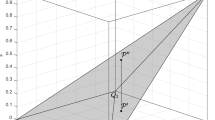Abstract
The concept of conditional event dealt with here is that given by Coletti and Scozzafava in a series of paper: a detailed account of the relevant theory is in their book “Probabilistic Logic in a Coherent Setting”, Kluwer (2002). In this paper, our aim is to show that relying on this definition many of the (putative) inconsistencies and flaws concerning this concept disappear. In particular, the well-known Lewis’ triviality principles can be looked on, in this framework, under a different perspective, also due to the circumstance that the concept of “indicative conditionals” (as put by Lewis, and also by Adams) is a very particular case of this general concept of conditional event. A crucial role is played, in our approach, by conditional events of probability 0 and 1.
Preview
Unable to display preview. Download preview PDF.
Similar content being viewed by others
References
Adams, E.: The Logic of Conditionals. Reidel, Dordrecht (1975)
Coletti, G., Scozzafava, R.: Conditioning and Inference in Intelligent Systems. Soft Computing 3, 118–130 (1999)
Coletti, G., Scozzafava, R.: Probabilistic logic in a coherent setting. Trends in Logic, vol. 15. Kluwer, Dordrecht (2002)
Coletti, G., Scozzafava, R., Vantaggi, B.: Coherent Conditional Probability as a Tool for Default Reasoning. In: Proc. IPMU 2002, Annecy, France, pp. 1663–1670 (2002)
Coletti, G., Scozzafava, R., Vantaggi, B.: Default Logic in a Coherent Setting. In: Benferhat, S., Giunchiglia, E. (eds.) Proc. 9th International Workshop on Non– Monotonic Reasoning, NMR 2002, Toulouse, France, pp. 275–282 (2002)
de Finetti, B.: La logique de la probabilité. In: Actes du Congrès International de Philosophie Scientifique, Paris 1935. Hermann, vol. IV, pp. 1–9 (1936)
de Finetti, B.: Sull’impostazione assiomatica del calcolo delle probabilità. Annali Univ. Trieste 19, 3–55 (1949) (Engl. transl.: Probability, Induction, Statistics, ch. 5. Wiley, London, 1972)
Di Nola, A., Scozzafava, R.: Partial Conditional Spaces (2003) (to appear)
Dubois, D., Prade, H.: Conditional Objects as Nonmonotonic Consequence Relationships. IEEE Transactions on Systems, Man, and Cybernetics 24, 1724–1740 (1994)
Goodman, I.R., Nguyen, H.T.: Mathematical foundations of conditionals and their probabilistic assignments. International Journal of Uncertainty, Fuzziness and Knowledge-Based System 3, 247–339 (1995)
Jeffrey, R.C.: The logic of decision. McGraw-Hill, New York (1965)
Lewis, D.: Probability of conditionals and conditional probabilities. The Philosophical Review 85, 297–315 (1976)
Lewis, D.: Probability of conditionals and conditional probabilities II. The Philosophical Review 95, 581–589 (1986)
Panti, G.: Multi-valued Logics. In: Gabbay, D.M., Smets, P. (eds.) Handbook of Defeasible Reasoning and Uncertainty Management Systems, vol. 1, pp. 25–74. Kluwer, Dordrecht (1998)
Author information
Authors and Affiliations
Editor information
Editors and Affiliations
Rights and permissions
Copyright information
© 2003 Springer-Verlag Berlin Heidelberg
About this paper
Cite this paper
Paneni, T., Scozzafava, R. (2003). Multi-valued Conditional Events Avoid Lewis’ Triviality Result. In: Nielsen, T.D., Zhang, N.L. (eds) Symbolic and Quantitative Approaches to Reasoning with Uncertainty. ECSQARU 2003. Lecture Notes in Computer Science(), vol 2711. Springer, Berlin, Heidelberg. https://doi.org/10.1007/978-3-540-45062-7_35
Download citation
DOI: https://doi.org/10.1007/978-3-540-45062-7_35
Publisher Name: Springer, Berlin, Heidelberg
Print ISBN: 978-3-540-40494-1
Online ISBN: 978-3-540-45062-7
eBook Packages: Springer Book Archive




